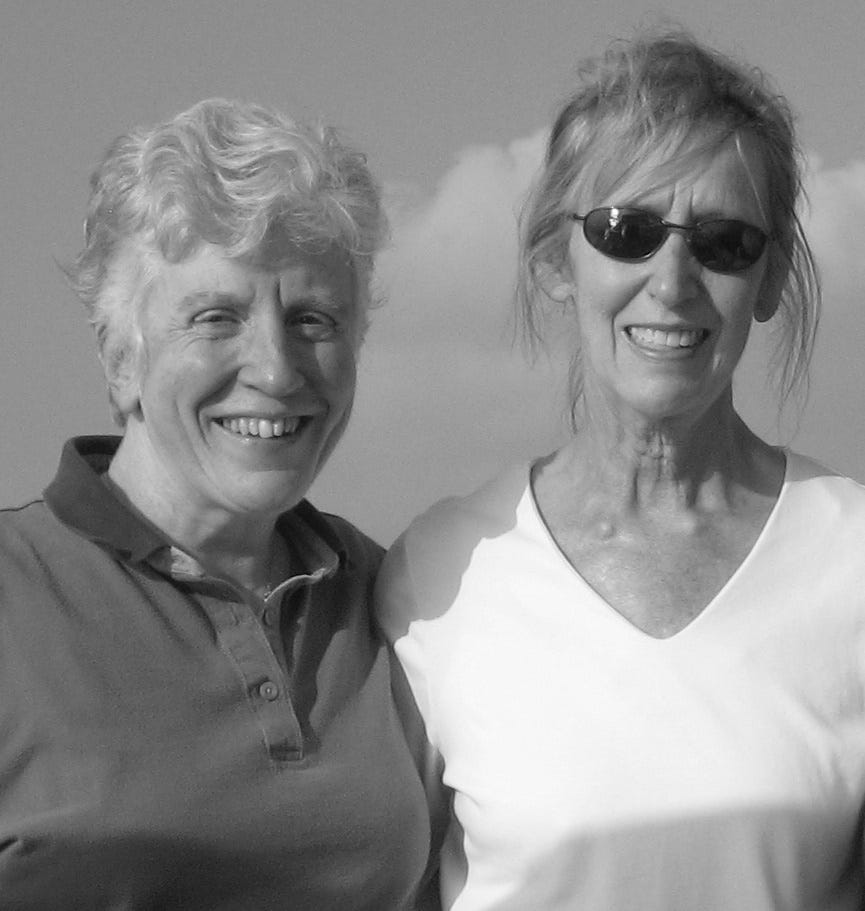In my sophomore year of college, I started volunteering at a community substance abuse and mental health crisis center, Call Someone Concerned/Crisis Walk-in Center in Adrian, Michigan. It soon became my passion. I spent more time there than I did at school. At first, I worked shifts answering the crisis line and talking with walk-in clients, but before long, I trained to be a trainer of new volunteers. Several times a year, we offered intensive training in empathic listening skills and a variety of other topics from tenant rights to suicide prevention. Bonnie, newly hired as a drug counselor for the center, came through one of those trainings. We immediately hit it off, and now, almost fifty years later, we remain dearest friends.
Bonnie went on from her humble beginnings as a drug counselor to running one of the State of Michigan’s largest regional substance abuse funding agencies. As a spokesperson, organizer, evaluator, and political negotiator, Bonnie never backed down. Her formidable presence terrified some and inspired others. I was part of the latter group. No other word described her in those days than a “force.” Bonnie is a stately woman with beautifully styled blond hair and piercing eyes. Always dressed to the nines when in her professional role, she was someone others noticed when she walked into a room.

Pitted against Michigan Governor John Engler, she worked tirelessly with then state Senator Debbie Stabenow (now a U.S. Senator) to pass strong drunk driving legislation—something you’d think everyone would support but was vehemently opposed by those who purported to protect individual liberties and, of course, the alcohol industry. Nevertheless, Bonnie didn’t quit until the legislation became law. If Bonnie sets her sights on getting something done, you’d better move out of the way because she will not stop until it is accomplished.
As I was finishing my Master of Social Work degree in Boston, I began looking for employment opportunities in the Boston area. On a Friday afternoon, I was offered a position as the Executive Director of a Women’s Alcoholism Treatment Center in Lowell, Massachusetts. Despite the low salary, I was thrilled to accept it. In many ways it was a dream job. It combined my previous work in substance abuse with my commitment to working with women. My partner Anne and I would be able to stay in Massachusetts, which was a high priority for her, and I would get to do something I was passionate about.
And then just two days later, I received a call from Bonnie. “I need someone to conduct a needs assessment and make a recommendation about whether Hillsdale County could support an outpatient substance abuse treatment center,” she said, “I wonder if you’d come back to Michigan to do it for me?”
She explained that it was a consulting job that would probably take six to nine months and that there was no guarantee of employment after it was over, but she’d really like me to do it. It took me no time at all to decide to say yes. I knew that working with Bonnie as my mentor would be an opportunity I could not pass up. And I have always believed that more opportunities follow when you say yes to something good, so I had no concerns about what would happen after the consulting job ended. Something would come along. The hardest part was explaining to Anne why I wanted to do this and what it would mean for us. Given that she was between jobs (you’ll read more about Anne in an upcoming story), she finally agreed that she would leave her beloved New England and move to rural Michigan with me.
As it turned out, when I completed the needs assessment and determined that it made sense to open an outpatient clinic in Hillsdale, I became its executive director with funding from Bonnie’s agency. Anne found a job too, working for my old friend Clare, at Bixby Hospital’s Alcoholism Program in Adrian, which set her up for a career change that served her well for the rest of her life. So, it all worked out.
And most importantly, I got to work with and learn from Bonnie, who taught me how to not back down in tough situations. One strong memory is of the time we met with a circuit court judge in Hillsdale who told us he would send any woman who complained of being abused by her husband immediately back home to him. As the words came out of his mouth, I didn’t have to look at Bonnie to feel her rage and know he was at the receiving end of those piercing eyes of hers. As I sat there not having a clue how to respond, Bonnie stood up, and in a voice that cut through the room, said, “We are done here, but don’t think this is over.” And with that, she turned and marched out of his office, with me following behind.
I don’t remember what happened, if anything, when she reported him to the judicial review board, but I do know that in any future interactions with people in power in the community, she never failed to mention what he had said. Even if he faced no official repercussions, nevertheless, she persisted (before it became a meme!).
Bonnie represents the embodiment of power well used. Whenever I’m in a challenging situation, I summon Bonnie’s tenacity, persistence, determination, and political savvy to move me through it. Sometimes I’m able to live up to her standards, while at other times, I fail miserably. Regardless, I’m grateful to have such a strong mentor and dear friend in my life.




